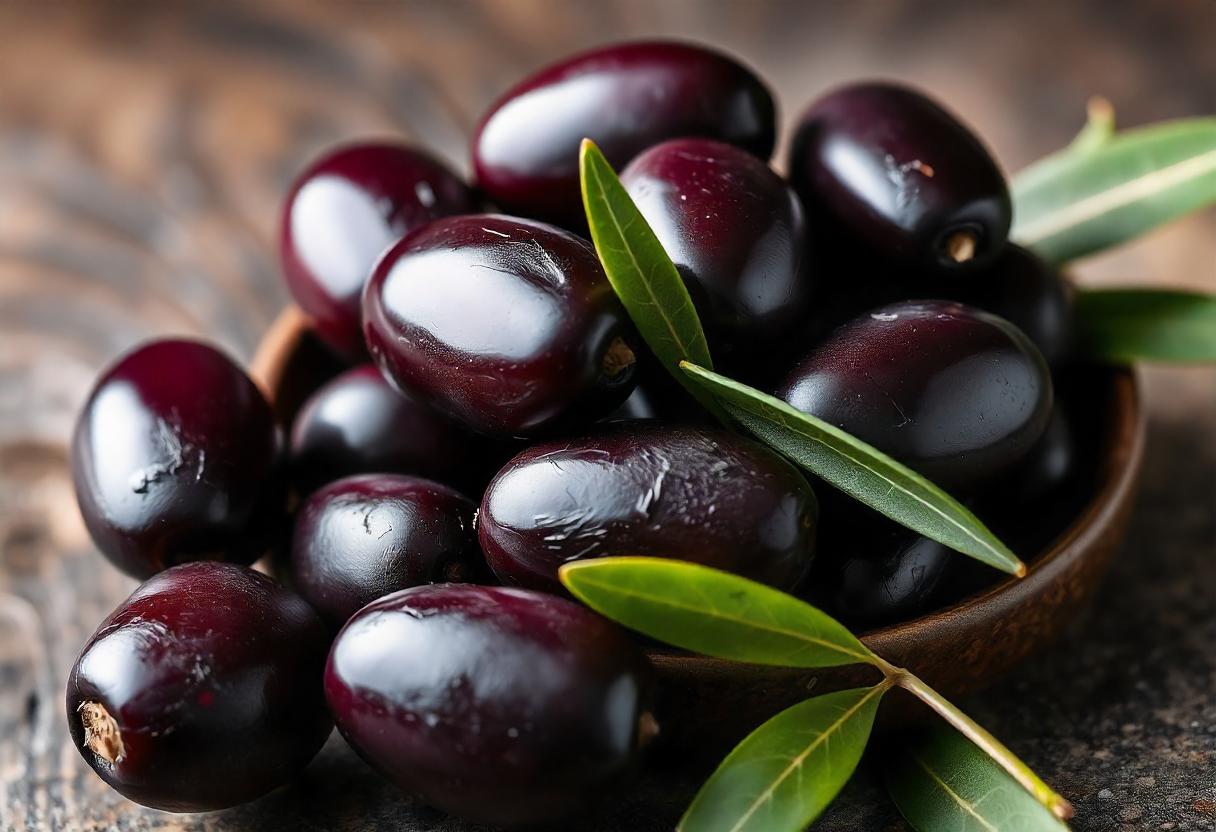Kalamata olives are a cornerstone of Mediterranean cuisine, celebrated for their robust flavor and remarkable nutritional profile. Renowned for their unique taste and deep purple hue, they are not only delectable but also loaded with health benefits. This guide delves into the specifics, covering everything from their origins and nutritional value to recipes and sustainable options. Let’s discover why these olives deserve a place in your diet!
What Are Kalamata Olives?

Origins and Unique Flavor Profile
These olives come from the city of Kalamata in the Peloponnese region of Greece. They are recognized for their distinctive almond shape, deep purple hue, and robust flavor that harmonizes savory, salty, and subtly fruity notes. Traditionally, they are cured in brine or vinegar, which enhances their taste and preserves them for extended use.
Kalamata Olives vs. Other Olives
Unlike green or black olives, these olives are picked later in the season, resulting in a more mature flavor and texture. Their deep color, firmer flesh, and unique taste make them a favorite in Mediterranean salads, tapenades, and various other dishes.
Nutritional Profile of Kalamata Olives
They are small but mighty, packed with essential nutrients and antioxidants.
Macronutrients and Calories
In a serving size of about 10 olives (roughly 28 grams), you’ll find:
- Calories: 40
- Fat: 3.5g (primarily monounsaturated fat)
- Protein: 0.3g
- Carbohydrates: 2g
Vitamins, Antioxidants, and Phytochemicals
These olives are also rich in:
- Vitamin A: Supports eye health and immune function.
- Vitamin E: Acts as a powerful antioxidant that protects cells.
- Polyphenols: These plant-based antioxidants help combat oxidative stress, inflammation, and reduce the risk of chronic diseases.
Top 12 Amazing Health Benefits of Kalamata Olives
Incorporating these Mediterranean olives into your diet can provide a range of health benefits:
1. Supports Heart Health
Greek olives contain monounsaturated fats that help lower LDL (bad) cholesterol levels, thereby reducing heart disease risk. Including these healthy olives in your meals can make a positive impact on cardiovascular health.
2. Anti-Inflammatory Properties
Rich in compounds like oleuropein, a known anti-inflammatory agent, authentic Greek olives can reduce inflammation, supporting both joint and muscle health.
3. Enhances Brain Health and Cognitive Support
Polyphenols in brined olives improve cognitive function and protect brain cells, potentially reducing the risk of neurodegenerative diseases, making purple olives a brain-friendly choice.
4. Aids Digestive Health
These fiber-rich Greek olives offer a good amount of dietary fiber, which supports digestive health and regular bowel movements, making them ideal for overall gut health.
5. Improves Skin Health
With a high concentration of antioxidants like vitamins A and E, nutty olives help fight free radicals and promote radiant skin, reducing visible signs of aging and supporting skin elasticity.
6. Strengthens Immunity
The immune-boosting properties of vitamin E and polyphenols in rich-flavored olives make them an excellent addition to your diet for overall health and resilience against illness.
7. Supports Eye Health
Vitamin A found in Peloponnesian olives aids in maintaining good vision, especially in low-light conditions, helping you protect your eye health with a natural food source.
8. Helps Maintain Bone Density
The calcium and other essential minerals in Greek table olives support strong bones and may reduce the risk of osteoporosis, promoting long-term skeletal health.
9. Provides Antioxidant Protection
Authentic Mediterranean olives are packed with antioxidants that help protect cells from oxidative damage, which is linked to aging and chronic diseases.
10. Manages Blood Sugar Levels
The healthy fats in savory olives can stabilize blood sugar levels, making them a beneficial choice for those with or at risk of diabetes. They’re a flavorful, nutritious way to support blood sugar control.
11. Reduces Risk of Chronic Diseases
The antioxidants and healthy fats in Greek purple olives contribute to a reduced risk of chronic illnesses, including heart disease and diabetes, supporting overall longevity.
12. Supports Weight Management
Low in calories yet satisfying, rich-flavored table olives can help manage hunger and support weight loss efforts by curbing cravings, making them an ideal snack for those aiming to maintain or reduce weight.
The Role of Kalamata Olives in the Mediterranean Diet
The Mediterranean diet is renowned for its health benefits, largely due to its emphasis on whole foods like vegetables, fruits, legumes, fish, and olive oil. These olives are a staple in this diet, providing not only flavor but also nutritional value that supports heart health, longevity, and disease prevention. The healthy fats in Kalamata olives make them a valuable addition to any balanced diet.
Popular Recipes with Kalamata Olives

These olives add a robust flavor to a variety of dishes. Here are a few popular ways to enjoy them:
Classic Greek Salad with Olives Kalamata
A Greek salad combines Olives Kalamata, cucumbers, tomatoes, red onions, and feta cheese, all topped with a drizzle of olive oil and oregano. This simple dish is refreshing and packed with nutrients.
Mediterranean Pasta with Kalamata Olive Tapenade
A homemade tapenade made from Olives Kalamata, garlic, and olive oil adds rich flavor to pasta. This dish is paired with roasted vegetables or grilled chicken for a balanced, delicious meal.
Kalamata Olive and Feta Bread
They add a wonderful salty flavor to homemade bread, making it perfect for dipping in olive oil or pairing with cheese.
Tips for Buying Quality
When purchasing it, consider these tips to ensure you’re getting high-quality olives:
- Color and Texture: Authentic olives Kalamata have a dark purple color and a firm texture.
- Packaging: Olives are available in brined, jarred, and canned forms. Brined olives tend to have the best flavor and texture.
- Origin: Check the label to see if the olives are sourced from Greece for authenticity.
How to Store and Preserve
Proper storage is essential to maintain the taste and quality of olives Kalamata.
- Fresh Olives: Store in a cool, dry place and consume within a few weeks.
- Brined Olives: Keep them submerged in their brine in the fridge to maintain flavor.
- Jarred Olives: Once opened, refrigerate and use within a few weeks for optimal taste.
Sustainable Choices and Environmental Impact
Choosing organic or eco-friendly olives can help reduce the environmental impact of your food choices. Look for certifications such as organic or fair-trade on the packaging to support sustainable farming practices. Organic olives are also less likely to contain pesticides or harmful chemicals, making them a healthier choice for you and the planet.
Olives Kalamata in World Cuisines
While closely associated with Greek cuisine, Greek olives are popular in Middle Eastern, Italian, and even Mexican dishes. They bring a unique tangy flavor that complements a variety of flavors and can be substituted with other brined black olives if unavailable.
Exploring the Kalamata Olive Harvesting and Production Process
They are hand-harvested to ensure they retain their quality. Once harvested, they go through a curing process to reduce their natural bitterness. This can include brining, dry-curing, or even fermentation, each of which influences the final flavor.
Kalamata Olive Oil: Benefits and Uses
Kalamata olive oil, made from these specific olives, offers a fruity flavor and numerous health benefits. It’s especially high in antioxidants, making it an excellent choice for salads, marinades, and low-heat cooking.
How to Make Homemade Kalamata Olive Tapenade
Tapenade is a classic Mediterranean spread made with these olives. Here’s a quick recipe to try at home:
Ingredients:
- 1 cup Kalamata-olives, pitted
- 2 cloves garlic
- 1 tablespoon capers
- 2-3 tablespoons olive oil
- Fresh herbs (parsley or basil) to taste
Instructions:
- Combine all ingredients in a food processor and blend until smooth.
- Adjust olive oil for a spreadable consistency.
- Serve with crackers or use as a topping for meats and vegetables.
Conclusion
They are not only delicious but also rich in nutrients that can enhance overall health. From supporting heart and brain function to adding depth to your favorite recipes, Greek olives have secured their spot in the Mediterranean diet and beyond. Consider incorporating them into your meals, whether it’s a classic Greek salad or a homemade tapenade, and savor both the flavor and health benefits they offer.
Frequently Asked Questions
Are Kalamata olives safe for people with sodium concerns?
They can be high in sodium due to the brine, so look for low-sodium options or rinse them before use.
Can you substitute other olives for Kalamata in recipes?
Yes, black olives or Niçoise olives can be good substitutes, though they will vary in taste.
What’s the shelf life of Kalamata olives?
Jarred olives last up to two years unopened; once opened, refrigerate and use within two weeks.
Join the olives Community
Are you ready to experience the unique taste and health benefits of Kalamata olives? Try out one of the recipes in this guide, and let us know how it turns out! For more Mediterranean diet tips and health insights, subscribe to our newsletter!



